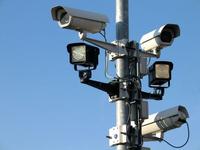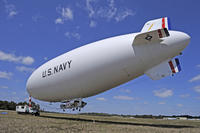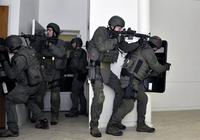-
Emulating stingray movement to build next generation of submarines
Stingrays swim through water with such ease that researchers believe that emulating the fish’s unique way of swimming could improve deep-sea vehicles’ agility and fuel efficiency. “Most fish wag their tails to swim. A stingray’s swimming is much more unique, like a flag in the wind,” says one researcher.
-
-
Insects’ way of flying inspires design of tiny flying robots
Researchers have identified some of the underlying physics that may explain how insects can so quickly recover from a stall in midflight — unlike conventional fixed wing aircraft, where a stalled state often leads to a crash landing. The analysis improves the understanding of how insects fly and informs the design of small flying robots built for intelligence gathering, surveillance, search-and-rescue, and other purposes.
-
-
Philippines prepares for worse disasters to come
On average, the Philippines experiences about twenty typhoons a year, including three super-typhoons and many incidents of flooding, drought, earthquakes, tremors, and occasional volcanic eruptions, making the country one of the most naturally disaster-prone areas in the world. Filipino government agencies, with the help of international disaster and relief agencies, have created new strategies for disaster preparedness, response, and mitigation which may well have potential applications in other parts of the world. As the impact of climate change grows more pronounced, the Philippines is becoming a hothouse for developing new methods and systems in the growing business of disaster relief.
-
-
Advanced police surveillance technologies pose significant privacy concerns

Much of the attention on surveillance in the media focuses on the National Security Agency (NSA), but there is not a lot of scrutiny on local domestic surveillance. In 1997, about 20 percent of police departments in the United States used some type of technological surveillance. By 2007, that number had risen to more than 70 percent of departments. Experts in criminal law and information privacy warn that the widespread use of advanced surveillance technologies such as automatic license plate readers, surveillance cameras, red light cameras, and facial recognition software by state and local police departments, combined with a lack of oversight and regulation, have the potential to develop into a form of widespread community surveillance, which ought to pose significant privacy concerns to law-abiding citizens.
-
-
U.S. Navy dominates competition for number, quality of patents
The IEEE evaluated more than 5,000 organization patent portfolios, across the seventeen industry sectors evaluated in its scorecard, for the number of patents issued as well as the growth, impact, originality, and general applicability across their respective portfolios. A laser with the potential to jam heat-seeking missiles and sniff out chemicals was one of 358 technologies patented by the U.S. Navy in 2012, helping the service dominate the government category in an annual ranking of patent portfolios published 23 October. It is an achievement the Navy has held since the scorecard added the government category in 2008.
-
-
Navy blimp returns to Maryland, Virginia, and D.C. skies today

The U.S. Navy’s only manned airship, a modified American Blimp Corporation A-170 series commercial blimp, will return to the skies of Maryland today, 12 November, to conduct week-long testing of experimental avionics systems.Results of this research may ultimately help protect forward deployed U.S. Army and U.S. Marine Corps troops around the globe.
-
-
DHS: conspiracy theories about DHS purchases unequivocally false

Conspiracy theorists have pointed to several DHS solicitations for gear and ammunition as “proof” that the department is in the process of creating, training, and equipping a secret force, the purpose of which would be to suppress public dissent – or worse: one blogger wrote that “Another possible conclusion [regarding DHS’s ammo purchases] is that the bullets are intended to coerce and, if need be, kill us.” DHS flatly rejects these conspiratorial assertions as unequivocally false, saying that each and every purchase is in line with past purchases and in support of on-going, legitimate, and transparent departmental operations.
-
-
DoD ends ambitious blimp program
The Department of Defensehas decided to end its Long Endurance Multi-Intelligence Vehicle (LEMV) project.The blimp was supposed to fly for as long as three weeks at a time, gather intelligence using 2,500 pounds worth of the most advanced cameras, sensors, and other intelligence technology. Operating at an altitude of 20,000 feet, the airship was designed to withstand enemy fire with its blend of fabrics, including kevlar. The Pentagon spent $297 million on the airship, but last month sold it back to one of the contractors which built it for $301,000.
-
-
Kenya, Somalia to create joint anti-terrorism task force
Al-Shabaab’s attack on the Westgate shopping mall in Nairobi last month has prompted security officials in Kenya and Somalia to consider the creation of a joint task force which will share intelligence, monitor activity, and track finances relating to terrorist groups operating in East Africa. Also under discussion is the establishment of a joint East African paramilitary force with jurisdiction throughout the region.
-
-
Body of evidence: bodies offer cues for recognizing people
Computer recognition of people has focused almost exclusively on faces, but a new study suggests it may be time to take additional information into consideration. A new study describes a series of experiments that demonstrates there is potentially more valuable information for biometrics-based identity recognition in images of people than the face alone.
-
-
Wildfire science returns to California’s Rim Fire

The challenging job of managing wildfires rests with other agencies, but the U.S. Geological Survey (USGS) provides the underlying science for sound land management decisions, before, during, and after wildfires. The USGS role studying natural hazards such as floods, landslides, earthquakes, and volcanoes is well known, but fewer people are aware of the USGS scientific work in major wildfire events, which are one of the most regular and sometimes most devastating natural hazards in the West.
-
-
Weakening cybersecurity to facilitate NSA surveillance is dangerous: experts
In the wake of revelations about the NSA surveillance programs, an expert on surveillance and cybersecurity recommended a re-evaluation of those surveillance practices that weaken commercial products and services. These practices include weakening standards and placing “back doors” into products that are accessible to U.S. government agencies. The expert – Jon Peha, former chief technology officer of the FCC and assistant director of the White House’s Office of Science and Technology — said deliberately weakening commercial products and services may make it easier for U.S. intelligence agencies to conduct surveillance, but “this strategy also inevitably makes it easier for criminals, terrorists and foreign powers to infiltrate these systems for their own purposes.”
-
-
Nuclear experts: world is safer, but risks remain
Speaking at a two-day short course on Nuclear Weapon Issues in the Twenty-First Century earlier this month, leading nuclear weapons scientists and policymakers said that despite some troubling areas, the world is a safer place than in past decades, and they expressed cautious optimism it is continuing in that direction. They warned, however, that despite this progress, crises involving nuclear weapons can still spiral out of control.
-
-
DHS testing face recognition biometrics
DHS is exploring the capabilities of facial recognition programs, and the technology’s implication for government and first responders. Initial stages of the project will begin by comparing video footage of people moving throughout the Toyota Center in Kennewick, Washington with combined mock profiles of volunteers.
-
-
U.S. tech companies could go “dark” to regain trust
With each new revelation of the scope of the American National Security Agency’s spying, perceptions of the importance of privacy are hardening around the world. There is thus a motivation for major technology companies to provide a verifiably secure means of allowing users to communicate securely without an ability for the companies to provide access to security agencies, even if requested to. Two companies, Silent Circle and Lavabit, have come together to form the Dark Mail alliance in an attempt to do exactly this.
-
More headlines
The long view
Factories First: Winning the Drone War Before It Starts
Wars are won by factories before they are won on the battlefield,Martin C. Feldmann writes, noting that the United States lacks the manufacturing depth for the coming drone age. Rectifying this situation “will take far more than procurement tweaks,” Feldmann writes. “It demands a national-level, wartime-scale industrial mobilization.”
How Male Grievance Fuels Radicalization and Extremist Violence
Social extremism is evolving in reach and form. While traditional racial supremacy ideologies remain, contemporary movements are now often fueled by something more personal and emotionally resonant: male grievance.
The Surprising Reasons Floods and Other Disasters Are Deadlier at Night
It’s not just that it’s dark and people are asleep. Urban sprawl, confirmation bias, and other factors can play a role.
Why Flash Flood Warnings Will Continue to Go Unheeded
Experts say local education and community support are key to conveying risk.
